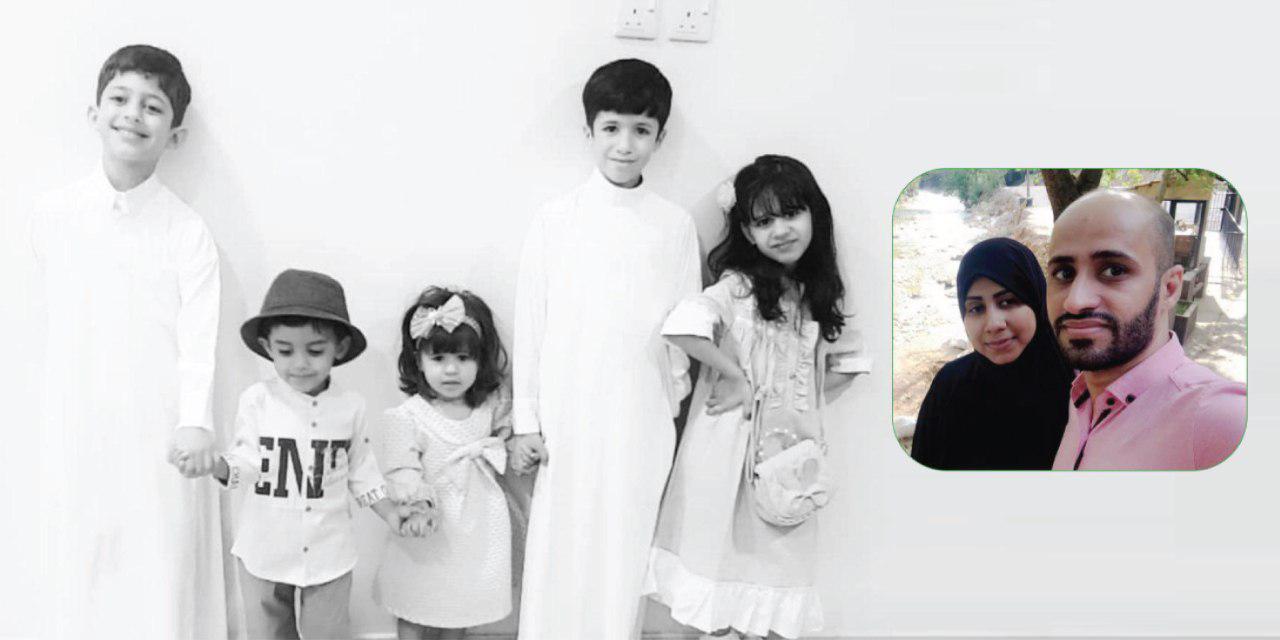
The Kingdom of Saudi Arabia continues to prevent five children and their mother from traveling and for almost a year has deprived them of seeing their father who lives abroad. On August 18, 2018, Mrs. Zahra al-Hashim and her five children (Hassan, 10, Hussein, 9, Zeinab, 7, Abbas, 3, and Fatima, 2) left Beirut, where she was living with her husband, the activist Ali Hashem al-Hajji, for a short visit to her family in Saudi Arabia during summer vacation. They were unexpectedly stopped in the King Fahd International Airport in Dammam, where their passports were confiscated and she was forced to sign documents of unknown content. There was a three-hour interrogation at the airport, followed by six subsequent calls from the General Investigation Directorate (Mabahith) in Dammam and Al-Ahsa.
The inquiries directed at her focused on the activities of her husband, and she was asked to urge him to stop his activities, media participation, and social media writing. This request to al-Hajji’s wife comes from the Saudi government at a time when he is receiving numerous and persistent threats over social networks, including threats to arrest members of his family in Saudi Arabia, if he does not stop his activities. He also received two calls from unknown numbers demanding he remain silent or he would be liquidated.
Al-Hajji told the ESOHR that one of his relatives in Beirut met him and said he was sent by the Saudi embassy to tell him he could possibly return to Saudi Arabia without being arrested. If he did not want to return, he should remain silent and stop his activities and media appearances. If he did not respond, a report would be submitted against him to the security authorities in Lebanon, and he would be handed over to Saudi Arabia. He also offered him a meeting with an embassy employee.
Al-Hajji had left Saudi Arabia on December 13 2016, for fear of arrest, torture, and harsh sentences against him because of his activities. He told the ESHOR that he has received numerous calls from the police, the Mabahith, and the court, some of them while he was in Saudi Arabia, and some after he left. All of the calls request his attendance. Al-Hajji participated in peaceful demonstrations demanding civil and political rightslaunched during the Arab Spring. The demonstrators later criticized the use of violence against citizens and the entry of the Peninsula Shield Force into Bahrain. He also participated in demonstrations condemning the acts of terrorism occurring in the Eastern Province, such as the Dalwa incident in 2014. In addition, al-Hajji used social media networks while he was in Saudi Arabia to criticize arbitrary executions and arrests and military operations targeting civilians.
The ESOHR considers preventing five children from reuniting with their father and threatening the wife if she communicates with her husband to be a policy of extreme injustice previouslyunknown to former kings of the country. Likewise, with the level of child abuse occurring in Saudi Arabia, the ESOHR considers it shameful that the Human Rights Council has taken no action concerning Saudi Arabia’s membership in the Council, a spot it now occupies for the fourth time.
Saudi Arabia’s disgraceful behavior in retaliation for al-Hajji’s activities – by causing painful psychological torment to his children and wife – is an ugly example of the degree to which Saudi Arabia stifles freedoms and targets civil society and emigrant activists through its oppressive assault.
تنتهك السعودية وبشكل صارخ المادة 13 من الإعلان العالمي لحقوق الإنسان، التي تؤكد أن “لكلِّ فرد حقٌّ في مغادرة أيِّ بلد، بما في ذلك بلده، وفي العودة إلى بلده”. وفيما يمنع هذه الإجراء لم شمل العائلة، فهو يشكّل انتهاكا واسعاً لاتفاقية حقوق الطفل التي صادقت عليها السعودية في 1996.
The ESOHR emphasizes that the repressive decisions in Saudi Arabia originate from a strongly centralized administration in which there is no separation of powers. Everyone is under the total rule of the king or the crown prince, who are supported by the repressive apparatus (Presidency of State Security) that carries out these violations on the king’s direct orders. The initiation of international legal accountability for the decision-makers (King Salman and his son, Mohammad) may be an effective deterrent to force them to reconsider these ugly abuses, which have culminated in the persecution of children as retaliation against political opponents and human rights advocates.
